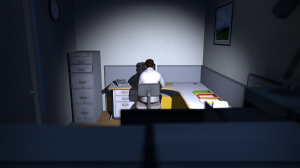My review of Spoiler Alert just went up today at GIZORAMA. If the title sounds familiar, I wrote about the first game trailer a few months ago. It is a PC platformer played in reverse and it’s really clever.
Read the full review.

My review of Spoiler Alert just went up today at GIZORAMA. If the title sounds familiar, I wrote about the first game trailer a few months ago. It is a PC platformer played in reverse and it’s really clever.
Read the full review.

I don’t know what to tell you. I really wanted to like this game. I played the original browser game forever ago and jumped on the opportunity to review the full release. I wish it was as good as the original game.
Full review at GIZORAMA.

My new review is up over at GIZORAMA. It’s the mini-sequel to Electronic Super Joy, one of the most entertaining and frustrating games I’ve ever played all the way through. The sequel is actually harder, but the significantly shorter length makes it a whole lot more manageable.
Electronic Super Joy: Groove City Review

My review of Infested Planet went up today at GIZORAMA. I really liked the game. I normally can’t handle RTS games (do you count tower defense as RTS? I’m a tower defense guru), but Infested Planet has some great usability mechanics that make it playable even with my messed up vision.
Infested Planet Review

 I’m happy to announce that I will be reviewing video games for GIZORAMA. It’s a great site with very thoughtful writers that you should be following.
I’m happy to announce that I will be reviewing video games for GIZORAMA. It’s a great site with very thoughtful writers that you should be following.
First up is my review of Not the Robots. Perhaps you’ve heard of the robot eating furniture stealth game already? It’s different than the type of game I’m usually drawn to but it has a lot of good things going for it.
Not the Robots Review

9.03m from indie developers Space Budgie is that game. Inspired by the devastating tsunami that hit Japan in 2011, 9.03m has you exploring the San Francisco coast for items and memories that have washed up in the wake of the disaster. You follow a string of guiding lights to a silhouette of a person enjoying the beach. That person transforms into an object–a toy, a locket, a wedding band–when you approach. You pick up the item and gently rotate it to find the hidden butterfly that reveals a simple memory–a name, an important date, an inscription–revealing the everyday lives cut short by the tsunami.
To say that game is emotional is an understatement. I was fighting back tears the first time a person transformed into their lost object. You become so used to the routine so quickly that the silhouettes themselves begin to tell a story. I started to slow down so I could give those people a little more time on Earth.
 So there I was, developing a new AAA title for my console The Best Games Console Ever, when disaster struck. My console was selling well against the GameStation and my games were critically acclaimed. I was a week away from launching the greatest MMORPG ever created. My profits dropped in the red during the development again–it happened a few years before when I first was developing the console–and this time, the bank said no more. The Best Games Company Ever went bankrupt and another developer bought all of my super popular franchises.
So there I was, developing a new AAA title for my console The Best Games Console Ever, when disaster struck. My console was selling well against the GameStation and my games were critically acclaimed. I was a week away from launching the greatest MMORPG ever created. My profits dropped in the red during the development again–it happened a few years before when I first was developing the console–and this time, the bank said no more. The Best Games Company Ever went bankrupt and another developer bought all of my super popular franchises.
Game Dev Tycoon is a super slick game development simulator from first time developers Greenheart Games. The premise is simple. You are an independent game developer starting out a few years before the release of the NES (every company, organization, and game console has an alternate name off by a few letters, I’m using the real names as necessary from here on out). You are randomly assigned game subjects–ninjas, music, evolution, vampires, space, etc.–and can choose one of six game genres to develop for.
When you start, your choice is text-based or simple graphics games and a variety of sliders to allocate your resources. The sliders set how much time is developed. For example, do you spend more time on sound or world design in phase three to release a casual fashion game for the PC market? After the game is released, you receive four reviews that impact your sales and you can generate a report that lets you know the ins and outs of making a law/action game (and if that’s even a good combo to release at all).


This is the beginning of a bizarre experiment in surrealism and video games agency (how collective choices influence a game) from Galactic Cafe. The game is all about choice. The framework always goes narrator’s choice or other option. Move on as instructed or go off the path. The further you wander, the stranger the game becomes.
On my first playthrough (the scenarios vary in length, but it’s only a few minutes from beginning to restart), for example, I caused the total nuclear annihilation of my little world at work. That happened because of one anti-narrator choice. To call that a jarring start to a gaming experience is an understatement. Yet I was sucked right into this bizarre world because the creators went that far.